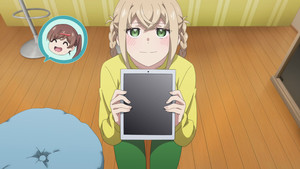
©くずしろ・講談社/「笑顔のたえない職場です。」製作委員会
Isn’t it great when the solution to a problem just magically appears, drunk at your doorstep? This episode is a little bit more predictable compared to the previous ones. The minute we saw Nana get writer’s block on how to portray the new rival character in her story, I knew that her rival would show up in the episode. Granted, I did not think that she would show up within a minute of that problem making itself clear, but at least this episode didn’t try to drag the inevitable out. If anything, a lot of ground is covered in a relatively short amount of time, and this is the only episode where th…

©くずしろ・講談社/「笑顔のたえない職場です。」製作委員会
Isn’t it great when the solution to a problem just magically appears, drunk at your doorstep? This episode is a little bit more predictable compared to the previous ones. The minute we saw Nana get writer’s block on how to portray the new rival character in her story, I knew that her rival would show up in the episode. Granted, I did not think that she would show up within a minute of that problem making itself clear, but at least this episode didn’t try to drag the inevitable out. If anything, a lot of ground is covered in a relatively short amount of time, and this is the only episode where they do not leave the studio outside of flashbacks. It’s a very minimalist episode, and the staff was banking on the rival Arisa to really sell it.
I think Arisa mostly did a good job, but a lot of that comes down to the voice actress. The different inflections that Yū Kobayashi goes through with this character are genuinely impressive. It doesn’t sound realistic, as Arisa is probably the most cartoonish character in the entire show so far. But it was entertaining hearing her constantly switch up her vocal delivery. One minute, she’s declaring herself as a rival with a pompous, almost boyish tone, and then the next minute she sounds like a distraught old woman. You really feel that the actress was having fun in the booth, and a lot of the comedy in the episode came from Arisa.
I wish we had arrived at the message a bit more organically. It really did feel like the episode was mostly very unserious, and then we just hit a wall of depression during the last five minutes before ultimately ending on another positive upswing. The message itself is actually really good. Arisa is a character who isn’t in a very particular good place with her series being canceled, and it seems like she’s been dealing with depression over it. She hasn’t been sleeping well, and I like how the episode punctuates this idea of needing to work on something that you know is going to be finished in just a few weeks. However, you’re not finishing it because you’re approaching the conclusion; you’re finishing it because you’re being told it’s over. It’s a very upsetting situation, but that is a situation that a lot of authors and creators run into. How Arisa projects all of this bravado when deep down she’s very upset about a very understandable situation does still hit home. The episode probably could’ve dropped hints introducing that idea alongside the wackiness, like it had done in previous episodes.
For now, it looks like Arisa is going to be a recurring member of the cast, and I’m curious what they’ll do with her. I don’t think she’s here to be an actual rival to Nana, because they didn’t really have a rivalry. If anything, I like how the episode lampshades rivals by trivializing the rivalry between Nana and Arisa. But now that the trope is dealt with, and we have wrapped up the explanation of what Arisa’s issue is.
**Rating: **
Bolts also streams regularly on Twitch as an indie Vtuber called Bolts The Mechanic where they talk about and play retro media!
- A Mangaka’s Weirdly Wonderful Workplace is currently streaming on Crunchyroll. *